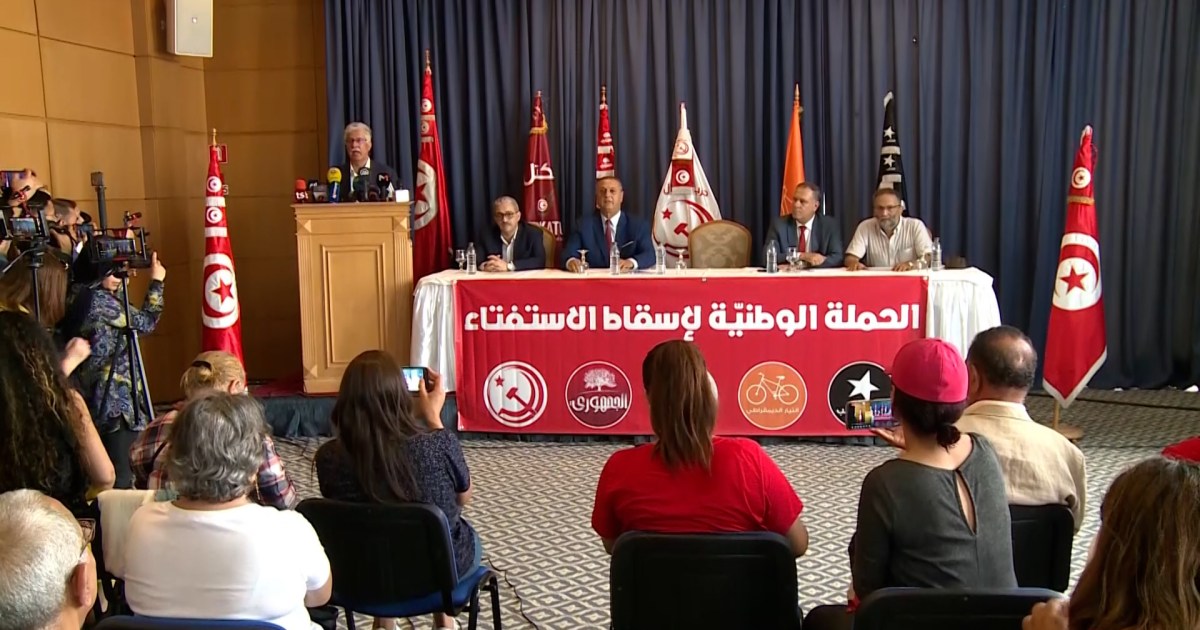Tunisian President Kais Saied said that his country has entered a new phase after the adoption of a new constitution, while Washington renewed its fears that Tunisian President Kais Saied would undermine the country's democratic institutions.
And the Tunisian Electoral Commission announced - yesterday evening, Tuesday - the acceptance of the new draft constitution after gaining the confidence of voters in the referendum on it by 94.60%.
She said that the total number of participants in the referendum was 2,756,607 out of 9.3 million eligible voters, and 2,607,848 voters voted "yes" to the new constitution.
In a speech among a crowd of his supporters on Habib Bourguiba Street before the appearance of the preliminary results last Monday evening, the Tunisian president said that there was a large turnout at the polling stations, and that Tunisia had entered a new stage.
Saeed stressed that the first decision after the referendum on the constitution will be to put in place an electoral law that will change the shape of the old elections, promising to carry out major reforms covering all fields.
escalating rejection
This comes at a time when opposition parties and forces renewed their rejection of the result of the referendum on the constitution, and called for early presidential and legislative elections.
The "National Salvation Front" - an alliance of opposition parties in Tunisia - accused the electoral authority of "falsifying" the turnout figures in the referendum, claiming that President Kais Saied's referendum "failed".
Front head Ahmed Najib al-Shabbi said, "The numbers that came out of the electoral organizing body are inflated and do not agree with what was observed in the regions and by observers. This body is not impartial and impartial, and the numbers are based on fraud."
He added - in a press conference on Tuesday - that "the only reference to legitimacy in the country is the 2014 constitution. Qais Saeed has no place left. His coup was disappointed. He must give way to general presidential and legislative elections until stability prevails."
He pointed out that the low turnout to participate in the referendum - which Chebbi said that "two thirds" of the voters boycotted - proves "the failure of Kais Saied's coup."
According to Chebbi, any commitment on the part of the International Monetary Fund with the current authority will lead to more social and political turmoil.
It is noteworthy that Tunisia requested a loan from the International Monetary Fund to help it deal with a severe financial crisis that exacerbated after President Kais Saied's monopoly on the executive and legislative authorities in July 2021.
standardization of positions
In addition to the Salvation Front, the opposition's voices rose to unify positions, mobilize its ranks, and invest twice as many voters in the referendum and the rate of participation that the country did not witness in all the electoral stations that followed the revolution.
The dissolved Tunisian Parliament Speaker Rached Ghannouchi said that the referendum procedures on the draft constitution are invalid.
During an interview with Al Jazeera Mubasher, he confirmed that the draft constitution that was referendum enshrines an individual system, noting that President Qais Saeed failed to mobilize his supporters, which was evident from the percentage of participation in the referendum.
For her part, Deputy Speaker of the dissolved parliament, Samira Chaouachi, said that the Tunisian people rejected the new draft constitution by boycotting the referendum.
She confirmed that the Salvation Front adheres to the 2014 constitution, adding, in a press conference, that Tunisians will not engage in what she described as the crime committed against their country.
In turn, former President Moncef Marzouki told Al Jazeera in a previous bulletin that the Tunisian constitution proposed by President Said to Tunisians is a fake currency and that the real currency is the 2014 constitution, according to him.
For his part, the Secretary-General of the Tunisian Workers' Party, Hamma Hammami, questioned the validity of the figures provided by the Independent Election Commission regarding the referendum.
And he said - in an interview with Al-Jazeera - that the referendum on the draft constitution has lost legitimacy to President Qais Saeed.
He added that he is facing a president who does not recognize his legitimacy, and an authoritarian constitution.
On the other hand, the Dean of Tunisian Lawyers, a member of the advisory body that drafted the new Tunisian constitution, Ibrahim Bouderbala, criticized the Salvation Front's call for Said to resign, describing the resignation request as absurd and unacceptable.
He said in a media interview that the turnout in the referendum was expected and reasonable.
American fears
In Washington, State Department spokesman Ned Price said that Washington was aware that the new constitution reduced surveillance and reduced freedoms, he said.
Price indicated - during a press conference - the concern that the new Tunisian constitution contains a weak separation of powers.
For his part, a statement issued by the Chairman of the US House of Representatives Foreign Affairs Committee Gregory Mix, the Chairman of the Senate Foreign Relations Committee and Bob Menendez, in addition to prominent members of the two committees, saw the referendum on a new Tunisian constitution as another troubling step by which President Kais Saied undermines democratic institutions.
The signatories indicated their particular concern about what they called the lack of a minimum turnout, and the insufficient public debate and participation by Tunisians.
The statement said that reports of the use of Tunisian state resources to induce a "yes" vote, and to prevent local election observers and journalists from entering polling stations, is also worrying.
The signatories to the statement urged President Said to work constructively with all Tunisians, end the state of emergency, and take steps to restore Tunisia's separation of powers, democratic institutions and the rule of law.

